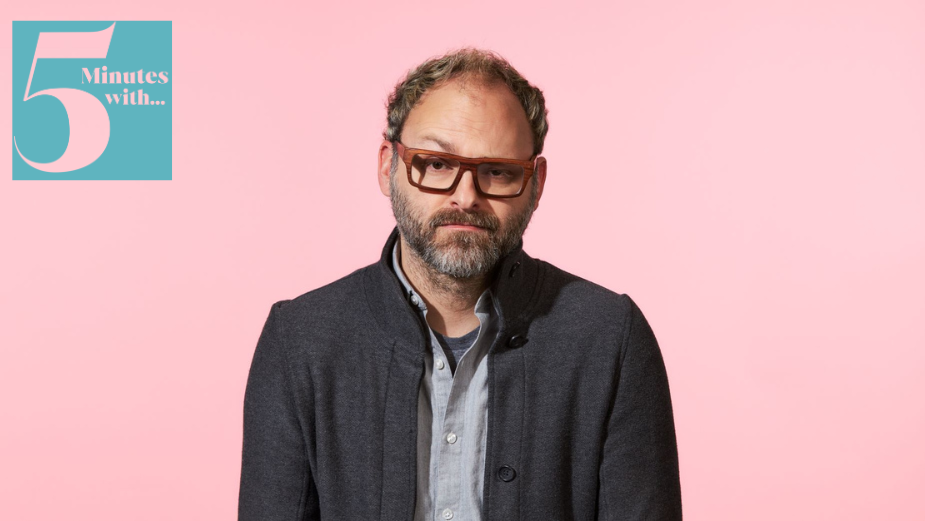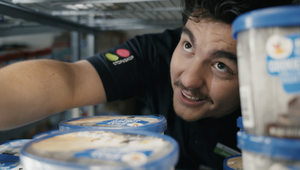
5 Minutes with… Jeff Warman

Jeff Warman loves being the scrappy, Midwest underdog, an attitude he proudly brings to Cincinnati’s Curiosity as agency partner and its chief creative officer.
Born and raised in the city, Jeff left the Midwest to explore a career in journalism. After internships in the White House press department and CBS News, and an International Radio & Television Society fellowship, he started his career in New York working on documentaries at CBS News Productions. While in the studio at CBS, Jeff sharpened his ability to tell attention-demanding stories, but the work wasn’t satisfying the creative nature that lay deep within his heart. So, he headed back home to pursue more creative storytelling.
Jeff landed his first copywriting job over 20 years ago. His work for the Ohio Tobacco Prevention Foundation’s ‘Stand’ campaign carved out a name for himself. Later, he started his own agency with former NFL star and TV personality Dhani Jones, where Jeff helped lead the vision behind repositioning the LIVESTRONG Foundation after the PR turmoil with Lance Armstrong.
Since joining Curiosity in 2018, the agency has been growing in reputation and stature with industry award recognition and high-profile client wins like Brooks Running, Dude Wipes, Native Deodorant, Holland America Line, FreshDirect and more.
LBB’s Addison Capper chatted with Jeff.
LBB> You started out as a producer at CBS. How does that television production experience shape your approach to creativity?
Jeff> I worked in the documentary division of CBS called News Productions, where we wrote and produced documentaries made for channels like A&E, The History Channel and The Learning Channel. It definitely gave me the fundamentals for figuring out how to tell a story and how to see the interesting bits in what, on the surface, might seem mundane. I was forced to pull out what was unique about a story and what arc it should follow and do it all in a high-stress, tight-deadline environment with a small team. It was always intense making some of those decisions so quickly because you needed the remainder of the time to execute the vision. So while it wasn’t the most creative environment, it gave me such a great foundation for the ad world and forced me to contend with so many of the factors pushing against creativity.
LBB> How did you wind up in advertising? A happy accident or something more planned?
Jeff> A little bit of both. While I was at CBS, my friends and roommates were making names for themselves in New York as artists, designers, and literal rock stars – all using their wild creative talents to make a living. I envied them so much and was endlessly inspired by them, but just didn’t know if I could essentially start over and find a creative career path for myself. So, ironically, I left New York to pursue my own creativity. I moved back to Cincinnati and then took a long road trip to really think about my future. I had a documentarian/journalist background and education, but had always done creative writing on the side and had this dream of being a creator of some kind. Fortunately, my brother worked as a tech guy at an ad agency and was telling the ECD there about my story and he wanted to meet me.
It seems silly now, but I really didn’t understand what happened at an ad agency, so that first meeting opened my eyes to the combination of creativity and business that happens inside those walls. It energised me, but I didn’t even know what an ad portfolio was at the time. They gave me a creative brief to test me and told me to come back in a week with taglines, scripts, headlines, doodles - anything to show how I would think about the brand’s challenge. A week later, I was back presenting my ideas to them, and one of the CDs responded, “Yeah, this looks like the kind of crap we do around here.” So they hired me as a junior copywriter. Over the years, I’ve tried to give the same opportunity to people looking to get into the business, and it’s led to some wonderful creatives and careers.
LBB> It seems like it's been a really positive time for Curiosity - what has driven that and what have been some key moments for you in the last year?
Jeff> To me, for the kinds of clients we’re attracting, making good work is table stakes. They can go to a lot of agencies for good work. But I think so much of what drives our success is how we operate beyond the work. If your ego starts to get a little too big here, you’re not going to make it. This is a place where we want the people to just be themselves – don’t get caught up in some weird ad agency stereotype of what you’re supposed to be. My partners, Ashley Walters and Trey Harness, and I go back a long way. We care about each other, root for each other, are vulnerable with each other and that has naturally extended into an agency culture full of care and vulnerability at the centre of it. Our clients see all of that and can tell we’ll welcome them into this world, too. It just takes so much pressure off when you know you can just be yourself. I know we’ve won some business because of who we are over what we create. And I’ll take that. Obviously, after that, we need to deliver the goods, and fortunately, we can do that, too.
We’ve had a few key moments over the last year that are impossible to ignore. When Ashley came back from Cannes and told us about a Ukrainian PR exec she had met there who had a profound effect on her, we knew it would be a moment for our staff to understand we have an opportunity to make a bigger impact on the world if we just seize it. Another key moment was the day we got a call from the Ad Council. It had always been a dream of mine to get that call. And we’re now engaged in a programme with them. Winning the DUDE Wipes account was another completely different kind of moment. We didn’t do any spec for them, but found other ways to show them who we were, and they hired us on the spot. They’re like no other client we have. All these things are really rewarding for a small shop in the Midwest that has to fight to get noticed.
LBB> Tell me about ‘Bathtub Creative’. What was the inspiration behind launching it and what are you aiming to achieve with it?
Jeff> Our partner in that initiative is Julia Petryk (the Ukrainian PR exec I mentioned earlier) who is the bravest person I know. And there are a lot more Julias in Ukraine who shouldn’t be forgotten as they try to live their lives while being brutally attacked. That was at the core of ‘Bathtub Creative’ – don’t forget about these people and help them. Our goal was to bring their stories closer to our lives in America. Find ways to make it relatable. The idea of the fictional ‘Bathtub Creative’ teased out to be a real agency could simultaneously poke a little fun at the ad industry but also dramatically pull you into the reality of people like us who are trying to survive each day in Ukraine.
LBB> How would you describe the type of work that Curiosity does best?
Jeff> Every client requires a different main course for their work, but there are a few things happening in the back kitchen that are consistent for everything we make. The final work is never about us as an agency, but the process is all about us and starts with genuine curiosity – we’ve operationalised the value of asking a lot of questions at the beginning of a project to really understand what’s possible for the brand. Because of that, the process is extremely collaborative, thoughtful and generally without pretension. That’s us at our best.
LBB> Which project are you most proud of from recent times and why?
Jeff> There’s a lot to be proud of – the ‘Bathtub Creative’ work is an obvious choice – and a lot in the works I can’t wait to launch. But I’ll veer off a little here and say I’m most proud of our work on our own Curiosity brand. The last few years were a complete overhaul of the brand - how we represent ourselves on our site, in social, with our swag, and how that all seeps into our culture. We’ve allowed ourselves to mostly focus on just making us happy and not worry too much about the outside world. But you can really get to know what we’re all about by just spending a little time on our IG.
LBB> How do you think about your role as a creative leader? How have you shaped a culture and environment in which creativity can flourish?
Jeff> For our people, my first priority is to make it comfortable for them to be exactly who they are. ‘Be you’ is one of our values for a reason. I don’t want anyone feeling like they need to step into some affected or performative role. Once they are part of our team, I just want everyone to be their normal selves, whatever that normal is for them. The results are usually a lot of wonderfully abnormal normals. My second priority is to try to reduce stress and the intensity of certain situations for our creatives. I try to be a ‘don’t-worry-we’ll-figure-it-out’ kind of creative leader, and that usually carries over to the agency attitude when challenges arise. I think those two approaches take the edge off of a lot of creative barriers.
LBB> Advertising has been adapting to the new challenges and opportunities wrought by technology for decades now and the industry seems to have absorbed those new things into its creative practice - just look at this surge of AI we’re seeing (which seems to be improving by the week). Does that represent a unique threat to creativity or will creatives adopt and adapt to it?
Jeff> We’ll adapt where it makes sense. I think AI can give you a starting point or something to react to. And that’s fine. But, in general, new tech over the years has been a tool, not a solution. For those who see it as a solution, they were never going to do anything interesting anyway. It’s just too wildly difficult to replicate or fake real sincerity. Compare it to any art — a computer can generate art, but the most meaningful art carries with it heart and soul and story, and that only comes from human experience and emotion.
LBB> Outside of work, what do you get up to?
Jeff> The fam. My wife (who was my creative partner for over 10 years) is now a crazy brilliant interior designer and an even better mother. She’s out of my league in so many ways, but especially in her creativity, so she’s a constant inspiration. And our 11-year-old blows our minds with her creative talents, so I’m just trying to keep up with them most of the time, including reliving painful memories every night trying to do fifth-grade math homework.















